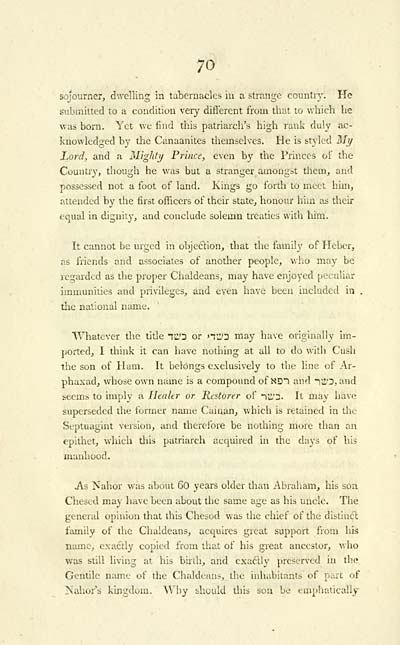Blair Collection > Celtic researches, on the origin, traditions & language, of the ancient Britons
(160)
Download files
Complete book:
Individual page:
Thumbnail gallery: Grid view | List view

70
sojourner, d'.velling in tabernacles in a strange country. He
submitted to a condition veiy difterent from that to \vhich he
was born. Yet we find this patriarch's high rank duly ac-
knowledged by the Canaanites themselves. He is styled My
Lord, and a Mighty Prince, even by the Princes of the
Country, though he was but a stranger amongst them, and
possessed not a foot of land. Kings go forth to meet him,
attended by the first oflicers of their state, honour him as their
equal in dignity, and conclude solemn treaties with him.
It cannot be urged in objection, that the family of Heber,
as friends and associates of another people, who may be
regarded as the proper Chaldeans, may have enjoyed peculiar
immunities and privileges, and even have been included in .
tlie national name.
Whatever the title iẅ'D or »t^d may have originally im-
ported, I think it can have nothing at all to do with Cush
the son of Ham. It belongs exclusively to the line of Ar-
phaxad, whose own name is a compound of ND"i and -i;i'D,and
seems to imply a Healer or Restorer of "iü'd. It may have
superseded the former name Caman, Λvhich is retained in the
Septuagint version, and therefore be nothing more tlian an
epithet, which tliis patriarch acquired in the days of his
manhood.
As Nahor was about 60 years older than Abraham, his son
Chesed may liave been about the same age as his uncle. The
general opinion that this Chesod was the chief of the distincl
family of the Chaldeans, acquires great support from his
name, exactly copied from that of his great ancestor, v. ho
Avas still living at his birth, and cxa6lly preserved in the
Gentile name of the Chaldeans, the inhabitants of part of
>iahor's kingdom. Why should this son be emphatically
sojourner, d'.velling in tabernacles in a strange country. He
submitted to a condition veiy difterent from that to \vhich he
was born. Yet we find this patriarch's high rank duly ac-
knowledged by the Canaanites themselves. He is styled My
Lord, and a Mighty Prince, even by the Princes of the
Country, though he was but a stranger amongst them, and
possessed not a foot of land. Kings go forth to meet him,
attended by the first oflicers of their state, honour him as their
equal in dignity, and conclude solemn treaties with him.
It cannot be urged in objection, that the family of Heber,
as friends and associates of another people, who may be
regarded as the proper Chaldeans, may have enjoyed peculiar
immunities and privileges, and even have been included in .
tlie national name.
Whatever the title iẅ'D or »t^d may have originally im-
ported, I think it can have nothing at all to do with Cush
the son of Ham. It belongs exclusively to the line of Ar-
phaxad, whose own name is a compound of ND"i and -i;i'D,and
seems to imply a Healer or Restorer of "iü'd. It may have
superseded the former name Caman, Λvhich is retained in the
Septuagint version, and therefore be nothing more tlian an
epithet, which tliis patriarch acquired in the days of his
manhood.
As Nahor was about 60 years older than Abraham, his son
Chesed may liave been about the same age as his uncle. The
general opinion that this Chesod was the chief of the distincl
family of the Chaldeans, acquires great support from his
name, exactly copied from that of his great ancestor, v. ho
Avas still living at his birth, and cxa6lly preserved in the
Gentile name of the Chaldeans, the inhabitants of part of
>iahor's kingdom. Why should this son be emphatically
Set display mode to: Large image | Transcription
Images and transcriptions on this page, including medium image downloads, may be used under the Creative Commons Attribution 4.0 International Licence unless otherwise stated. ![]()
| Early Gaelic Book Collections > Blair Collection > Celtic researches, on the origin, traditions & language, of the ancient Britons > (160) |
|---|
| Permanent URL | https://digital.nls.uk/75765640 |
|---|
| Description | A selection of books from a collection of more than 500 titles, mostly on religious and literary topics. Also includes some material dealing with other Celtic languages and societies. Collection created towards the end of the 19th century by Lady Evelyn Stewart Murray. |
|---|
| Description | Selected items from five 'Special and Named Printed Collections'. Includes books in Gaelic and other Celtic languages, works about the Gaels, their languages, literature, culture and history. |
|---|

